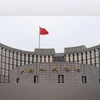By Bloomberg News
China is tightening trading restrictions on domestic institutional investors as well as some offshore units as authorities fight to stem a deepening stock rout, according to people familiar with the matter.
Officials this week imposed caps on some brokerages’ cross-border total return swaps with clients, limiting a channel that can be used by China-based investors to short Hong Kong stocks, said the people, asking not to be identified discussing a private matter. At the same time, some Chinese brokers that use the channel to buy mainland shares for their offshore units were told not to reduce their positions, the people said.
Some quantitative hedge funds meanwhile were banned from placing sell orders completely starting Monday, while others were barred from cutting stock positions in their leveraged market-neutral funds. These bets, known as a Direct Market Access strategy, are believed to have amplified the recent selloff in small-cap stocks, the people added.
China is trying to stabilize markets after shares sank to a five-year low in chaotic trading on Friday. The latest moves add to the piecemeal steps policymakers have taken as they struggle to end a three-year rout that’s erased some $7 trillion of value and dented confidence in the world’s second-largest economy.
In a statement Monday, the China Securities Regulatory Commission said it recently discovered multiple cases of stock market manipulation and “malicious short selling.” The regulator vowed to act quickly to stop illegal behavior that hinders stable stock market operations and hurts investors.
Representatives for the Shanghai and Shenzhen stock exchanges didn’t respond to requests for comment.
Weak economic data, simmering geopolitical tensions with the US, a worsening property crisis and an opaque crackdown on the financial sector have all weighed on investor sentiment. Margin calls and forced liquidation faced by shareholders are emerging as key pressure points after the latest pledge of support provided few details.
Shares rebounded in the afternoon Monday as the securities regulator said it will take steps to prevent risks stemming from share pledges. The CSI 300 Index ended the day 0.7% higher after earlier dipping 2.1%. Gauges of small cap shares pared losses but still closed deep in the red.
Hong Kong’s Hang Seng Index has dropped 9% this year after four consecutive years of losses while the onshore benchmark CSI 300 Index is down almost 7% and traded near the lowest level since 2019.
Measures to limit selling could provide some short-term relief but may be counter-productive as investors worry about their ability to exit the market, said Michael Hirson, China economist at 22V Research in New York. Beijing could carry out large stock purchases, though it would be expensive and it’s not clear the issue has become urgent enough for them to do this, he added.
“The net result is that they may muddle through with stop-gap measures and hope that the selling runs its course,” he said.
Chinese stocks with small- and medium-sized market capitalizations, which many quant funds trade on, have been under particular selling pressure lately. The CSI 1000 index of small companies fell 6% on Monday, entering the seventh consecutive losing session.
The latest curbs add to steps taken to limit short selling, in which investors bet on a stock decline. China halted the lending of certain shares for short selling last week. Under the measures, strategic investors aren’t allowed to lend out shares during agreed to lock-up periods.
Bloomberg reported earlier that state-owned Citic Securities Co. had stopped lending stocks to individual investors and raised the requirements for institutional clients after so-called window guidance from regulators.
“There is very little the CSRC can do to turn the market around,” said Neo Wang, managing director for China research at Evercore ISI in New York, adding the chances are slim they would go as far as banning short selling.
The CSRC also pledged on Sunday to prevent abnormal fluctuations, saying it would guide more medium- and long-term funds into the market and crack down on illegal activities including insider trading.
The measures may prove insufficient to convince traders who have been repeatedly disappointed by the government’s piecemeal approach to stimulus. Investors are worried about a negative loop where technical selling pressure triggered by margin calls and snowball derivatives worsens the market’s downfall.
Meanwhile, Liu Yuhui, an academic at a government think tank, was cited by a report as saying that the nation should set up a stocks stabilization fund as soon as possible to boost market confidence, with an aim to get its size to 10 trillion yuan ($1.4 trillion) or more.
In a separate statement on Monday, the securities regulator said it will guide brokerages to adjust their margin call levels and maintain “flexible” liquidation lines, in an effort to reduce pressure on the stock market and limit forced liquidations.
In another sign of how exasperated some investors have become, hundreds of thousands flocked to a social media post from the US embassy discussing giraffe preservation to vent their frustrations over the economy and slumping share prices. China’s internet users often struggle to find a venue to air grievances about the economy or government performance, with official accounts of state agencies or media usually either disabling the comment function or only showing selected feedback.
)